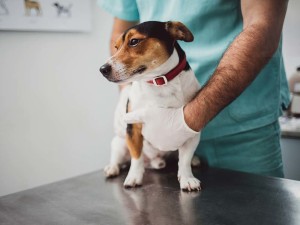Can You Give Dogs Imodium?
And what else you can give your dog for diarrhea.

Share Article
In This Article:
W hat is Imodium?opens in a new tab Is Imodium Safe for Dogs?opens in a new tab Using Imodium for Dogs opens in a new tab Frequently Asked Questionsopens in a new tab
Diarrhea is probably one of the most common reasons dogs visit me in my practice. I am often asked, “Can I give my dog Imodium?” Imodium is a popular household medication used in people to treat occasional diarrhea and the symptoms associated with diarrhea, including gas, abdominal cramping, and more.
But, is it safe for use in dogs? Not always. Learn about the potential risks, proper dosage, and when to consult with a veterinarian if your dog is experiencing acute diarrhea.

littleKin™ is Kinship’s home just for puppy and kitten parents. Bop over to check out expert advice, new pet tools, and special deals—all curated for your newest family member.
opens in a new tabWhat is Imodium?
Imodium (Lopermide) is the brand name for the over-the-counter drug used to treat diarrhea in people. This drug works by slowing down movement in the gut, which in turn reduces contractions in the intestines. As a result, you absorb more nutrients and liquid through your gut, making stool less watery and decreasing the number of times you visit the toilet.
Is Imodium safe for dogs?
Potential risks and side effects
In general, Imodium is not the first drug veterinarians reach for in dogs with diarrhea. There are many causes of acute diarrhea in dogs, including dietary indiscretion (ie., indulging in the mystery substance off the street or getting into the garbage!), parasites or other infections (viral, bacterial), dietary sensitivities or allergies, just to name a few.
If your dog is experiencing diarrhea, it’s important to investigate causes with your veterinarian. In the event of certain infections, Imodium should not be used, as it may result in worsening infection and the symptoms associated with this infection. Additionally, certain breeds of dogs may have a genetic mutation, which may result in severe or life-threatening reactions to common drugs, including Imodium. Common breeds impacted by these mutations are Collie breeds and other herding dogs (ie., Australian Shepherds).
In dogs, the most common side effects are salivation, constipation, bloating and sedation. It’s best to consult your veterinarian prior to administering any over-the-counter medications to your dog.
Toxicity concerns
Dogs with MDR1 gene mutations (Collie and herding breeds) should avoid this drug. In general, Imodium is not commonly prescribed in dogs with acute diarrhea, given the risk to certain breeds of dogs and the adverse effect profile of this drug.
When Imodium might be prescribed by a vet
In some cases, Imodium is used in treatment of chemotherapy-induced diarrhea in dogs. Imodium may also be used to treat non-infectious, intractable diarrhea in dogs (ie., diarrhea that is not responsive to either diet change or other approved therapies).
Is Imodium AD safe for dogs?
Imodium AD (loperamide) is safe for use in healthy dogs with intractable, noninfectious diarrhea, although not the first drug-of-choice in these cases. Oftentimes, diarrhea can be treated with a probiotic and short-term diet change to a bland food.
Imodium AD carries the same risk as regular Imodium, including sedation, bloating, constipation, and hypersalivation. Certain Collie and herding dog breeds may have a serious or life-threatening sensitivity to Imodium AD. It is best to consult your veterinarian prior to administering any over-the-counter medications to your dog.
Is baby Imodium safe for dogs?
Baby Imoidum (loperamide) should be avoided in dogs due to the artificial flavors and coloring used in this product. Occasionally, artificial sweeteners are used, which can be toxic to dogs, even in small amounts.
Is Imodium safe for pregnant dogs?
Safety in pregnant dogs has not been established, and therefore, should not be used, or used with significant caution. Imodium is excreted in the maternal milk of humans in small amounts, and should be avoided or used with caution in lactating dogs and nursing puppies.
Using Imodium for dogs
In dogs with acute diarrhea, a dog-specific probiotic and bland diet can be fed as a first line of treatment. Remember, bland diets are not balanced and should not be fed for more than a couple of meals. This will oftentimes be enough to clear acute, transient diarrhea.
If a dog is experiencing diarrhea and other signs of illness, including vomiting, inappetence, blood in the stool, bloating, etc. it is best to consult with your veterinarian to attempt to identify a cause of this diarrhea. If your dog is otherwise healthy and treatment has been unsuccessful, Imodium can be used short term for 1-2 doses in an attempt to reduce diarrhea frequency.
What Imodium is safe for dogs?
Plain Imodium (loperamide) is safest to use, but should be used with caution in dogs. Certain breeds, such as Collies or herding breeds, should not use Imodium due to potential sensitivity to this drug.
Imodium dosage for dogs by weight
It is best to consult your veterinarian before administering any over-the-counter drugs to your dog. Please note, these are not FDA-approved doses. Avoid or use with caution in Collies and herding breeds (Australian Shepherds).
9.9 pounds to 25 pounds): one milligram
26 pounds to 40 pounds: two milligrams
Administer one dose every eight hours for the temporary relief of diarrhea
Do not exceed more than three doses per 24 hour day, or more than 3 days of treatment
Imodium for dogs under heartworm treatment
There is no known information for use of Imodium in dogs undergoing heartworm treatment. Consult with your veterinarian before administering.
Monitoring your dog during treatment
Imodium should not be used for more than 3 days. If clinical signs do not improve or worsen during treatment, you should consult a veterinarian. If your dog experiences other signs, such as loss of appetite, vomiting, blood in the stool, bloating, or severe lethargy, please seek veterinary care immediately.
FAQs (People also ask):
Can I give my dog Imodium without consulting a vet?
It is always a good idea to consult your veterinarian before administering any medication. May vet practices offer telemedicine consults, if you are unable to get your dog to the vet in a hurry. Imodium can be used safely in some dogs, however in certain breeds, Imodium can cause serious or life-threatening side effects.
How long does it take or Imodium to work in dogs?
Imodium should start to work one to two hours following administration.
Is it safe to give my dog Imodium for diarrhea?
Although Imodium is safe to use in some dogs, it is not the first medication vets reach for in treatment of diarrhea. It is best to consult your veterinarian if your dog is experiencing diarrhea, or before administering any over-the-counter medications.

Dr. Gabrielle Fadl, DVM
After graduating from Kansas State University College of Veterinary Medicine, Dr. Fadl returned to the New York area to pursue a one-year rotating internship and has been working in general practice since. Dr. Fadl loves working in the pet space to foster the powerful human-animal bond. She hopes to continually learn and grow to practice the best quality medicine. Her motto is “Keep calm and try to take it as it comes.”
Related articles
![Happy woman at home cuddling on bed with cute jack russell dog.]() opens in a new tab
opens in a new tabGabapentin for Dog Seizures: Treatment, Dosage, and Side Effects
Everything you need to know about the anti-seizure medication.
- opens in a new tab
What Can I Give My Dog for Diarrhea?
It’s not fun for anyone.
![Veterinarian examining a dog]() opens in a new tab
opens in a new tabMy Dog Has Diarrhea. Should I Call the Vet?
Certain symptoms could mean your dog is battling a potentially fatal condition called hemorrhagic gastroenteritis (HGE). Here’s everything you need to know.
![Young woman comforting German Shepherd puppy outside.]() opens in a new tab
opens in a new tabMy Dog Is Pooping Blood: What Should I Do?
It’s an alarming sight, but here’s what you should know.
![A mini golden doodle puppy licking and grooming itself.]() opens in a new tab
opens in a new tabTreatment for Your Dog’s Bleeding Anus: Home Remedies and Medical Options
It’s not a pretty problem, but here are your solutions.
![feeding black dog rice water to help relieve diarrhea]() opens in a new tab
opens in a new tabVet-Approved Diarrhea Treatments
Shudder. It happens to all of us.








